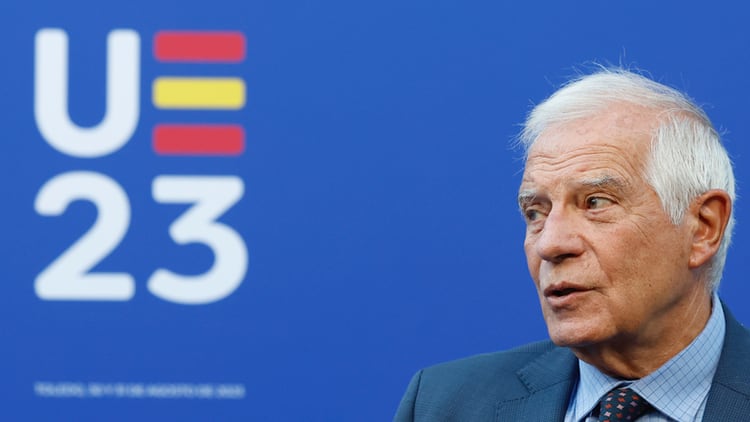The Diplomat
EU Foreign Ministers agreed at yesterday’s informal meeting (Gymnich) in Toledo to prepare sanctions against those involved in the 26 July coup d’état in Niger, according to EU High Representative for Foreign Affairs and Security Policy Josep Borrell.
Borrell, who appeared at a joint press conference at the end of the meeting with the acting Spanish foreign minister, José Manuel Albares, said that the EU-27 would study “any proposal” put forward by the Economic Community of West African States (ECOWAS) to restore constitutional order in Niger.
The Toledo meeting was attended by Niger’s Foreign Minister, Hassoumi Massoudou, the main representative of the overthrown Nigerien government, while President Mohamed Bazoum is still being held by the military coup leaders.
Massoudou welcomed the EU’s “political and moral support” and said that what they want now is “to accompany ECOWAS”. The president of the ECOWAS commission, Omar Touray, explained to the European ministers the position adopted by ECOWAS and the steps it has been taking, maintaining a firm stance against the coup leaders.
Among the options being considered by the African bloc is the possibility of military intervention, a hypothesis on which both Borrell and José Manuel Albares avoided commenting, arguing that it is not yet on the table. Both agreed that it is necessary to “restore constitutional order” and that, in this context, it is ECOWAS that takes the lead, as “African solutions to African problems” are necessary.
The EU favours the diplomatic route, but given the military junta’s reluctance to reverse the July coup, it has already agreed to initiate individual sanctions “strictly” in line with the ECOWAS approach. There will be humanitarian exceptions, Borrell clarified, so that the sanctions “do not become an additional punishment for the second poorest country in the world”.
“Borrell also took the opportunity to underline European “solidarity” with France, after Niger’s military junta ordered the departure of the French ambassador and yesterday even ordered the police to expel him on the grounds that, once the deadline initially granted to leave the country had expired, he lacked diplomatic immunity.
Both Borrell and Albares called for the release of Bazoum, the “democratically elected authority” in Niger, and stressed the importance of working towards stability in the Sahel. They are “very direct” African “neighbours”, the head of Spanish diplomacy pointed out.
The European High Representative stressed the position that he had already expressed before the meeting, saying that there are “differences” between the cases of Niger and Gabon – the latter is now outside the orbit of ECOWAS. In Gabon, according to Borrell, the elections that guaranteed a new mandate for President Ali Bongo already generated “many doubts” as to their “democratic validity”.
However, Borrell went on to stress that “nothing justifies the coup” and advocated, in the case of Gabon, resolving any differences through inclusive dialogue: “It is a better way than force to ensure that the will of the Gabonese people is respected”.
Prior to the meeting, Borrell had spoken to journalists in favour of the EU conducting an in-depth review of its policy towards Africa. For the High Representative, the series of coups d’état on the continent (Mali, Burkina Faso, Niger and now Gabon), as well as the presence of Wagner’s Russian mercenaries in Mali, Burkina Faso and the Central African Republic, show that it has not been “successful”.
EU Enlargement
On another matter, Borrell supported the idea of setting a date for the next enlargement of the EU, as he believed that it would help to “mobilise energies and boost the political process in which Ukraine and other countries in the Western Balkans are immersed.
When asked about the speech by the President of the European Council, Charles Michel, who said last Monday, during his address to the strategic forum in Bled (Slovenia), that the EU should be ready for enlargement in 2030, Borrell said that proposing a time limit could mobilise both the energies of the EU and those of the candidate countries, and stressed that “Ukraine should be a new member of the EU, as should the Western Balkans, quickly”.
At present, Albania, Bosnia and Herzegovina, Moldova, Montenegro, North Macedonia, Serbia and Ukraine have candidate status, while Georgia and Kosovo are considered potential candidates.






